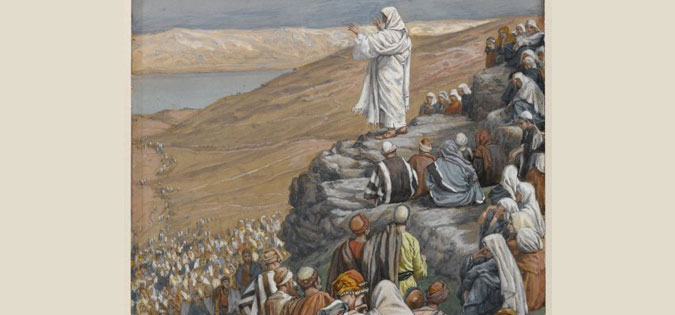 Pope Francis recently released an apostolic exhortation, Gaudete et Exsultate (Rejoice and Be Glad). The document is rich in reflections, such as one on the Beatitudes. I found the Pope’s commentary on the Beatitudes could serve as a kind of examination of conscience. How am I living out these Beatitudes, and where do I need to grow?
Pope Francis recently released an apostolic exhortation, Gaudete et Exsultate (Rejoice and Be Glad). The document is rich in reflections, such as one on the Beatitudes. I found the Pope’s commentary on the Beatitudes could serve as a kind of examination of conscience. How am I living out these Beatitudes, and where do I need to grow?
For example, Pope Francis asks us to reflect on the beatitude, “Blessed are the poor in spirit, for theirs is the kingdom of heaven” (Gaudete et Exsultate 67–70). Too often, he says, we think of our security as to be found in wealth, but wealth is ultimately nothing (68). Instead, we can seek Ignatian indifference, in which we do not set the fulfillment of our hearts on created goods. Pope Francis makes clear that he has in mind a material simplicity, an invitation to a “plain and austere life” (70). Do I see the connection between poverty in spirit and genuine indifference to wealth?A second beatitude, “Blessed are the meek, for they will inherit the earth,” reminds us not to have an air of superiority over others, but rather to look to others’ weaknesses with “tenderness and meekness” (72). We can and should correct the faults of others, but with love and a constant sense of our own limitedness and capacity to be tempted to the same kinds of things as those whom we might judge. Do I trust meekness and humility to guide me in a kinder approach?In considering, “Blessed are those who mourn, for they will be comforted,” Pope Francis encourages us not to run away from the pain and sorrow of others, but to bring relief instead of reacting out of fear. We can mourn with those who mourn so that they are not alone in their sorrow (76). Where do I stay with those in their suffering? Where do I sometimes flee out of fear or a sense of powerlessness?To “hunger and thirst for righteousness” does not suggest that meekness requires we be silent or complicit in the face of injustice. Quite to the contrary, the Pope asks us to consider whether we are undertaking the “pursuit of justice for the poor and the weak” (79). Do I hunger and thirst for righteousness, even if this makes me uncomfortable or involves social or material risks?Reflecting on these beatitudes can help me to see where God’s grace has been active in and through my own life, and where I still need God’s grace to lead a life of greater holiness.
Questions for Further Reflection
- Do I spend my money to get a sense of security, status, or temporary pleasures instead of sharing money with others for their basic needs?
- Could greater material simplicity also mean greater freedom to serve God and love others?
- Do I choose my work only for the sake of security, or also with attention to meaningful work to which God calls me?
- When I see others suffer, do I run away, or can I put aside my desire to control my own feelings and willingly enter into the flow of human experience?
- Where do I show compassion and empathy? Where can I grow in compassion?
- Do I work for social justice or stand up for others who are being treated unjustly? When I do stand up for justice, do I keep in mind my own personal limits or even possible complicity in the systems that I am seeking to change?
- Where do I still need to learn and to grow?
This is part one of a two-part reflection.

Food for thought and powerful at that!
The questions for further reflection really challenged me.
I will have to print and post this in my journal.
Thank you!
You are welcome, Michael! Pope Francis has a good challenge for us all! Blessings, Marina